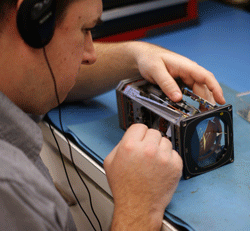Contributed by Don Fiedler, Manager of Component Solutions Business Development

Being aware of the circumstances surrounding any avionics component or system failure will save you time and expense.
Having the right information about the circumstances surrounding a squawk can save your avionics tech many hours of troubleshooting time (and yourself a considerable amount of money) for an avionics repair.
When a unit arrives at the shop for repair, sometimes the squawk is obvious; however, there are many times when it is not. Before sending in your unit for repair, be prepared with the answers to these two questions.
1. When does the squawk occur?
- Does the unit get too cold on the ramp (wintertime) or at altitude?
- Does the unit get too hot (summertime) or after the unit has been in operation for a while?
- Does the squawk occur intermittently?
2. What happens at the time of the squawk or its resolution?
- Is there vibration? Some aircraft produce more vibration than others.
- Is it overheating after long operation?
- Is there poor or no cooling to the unit?
- If the unit gets too cold at altitude and is located outside the cabin, what does the OAT indicate?
- Does the squawk occur in precipitation?
Many times the problem is related to other aspects of the flight or external conditions and may only fail on the bench when these conditions can be recreated. Taking note of the conditions when the component or system fails, is essential to the effective and timely resolution of the problem.
It’s also important to communicate this information when you ship the unit in for repair. It’s always a good idea to include a printed copy with the unit, and to follow-up a phone conversation with an e-mail of the critical details.
To find out more about Duncan Aviation's avionics repair services, contact an Avionics/Instruments Customer Service Representative.
Don Fiedler manages business development for Duncan Aviation’s Component Solutions program in Lincoln, Neb. He specializes in working with OEMs and vendors to expand Duncan's avionics service capabilities. He began working in aviation in 1962.


